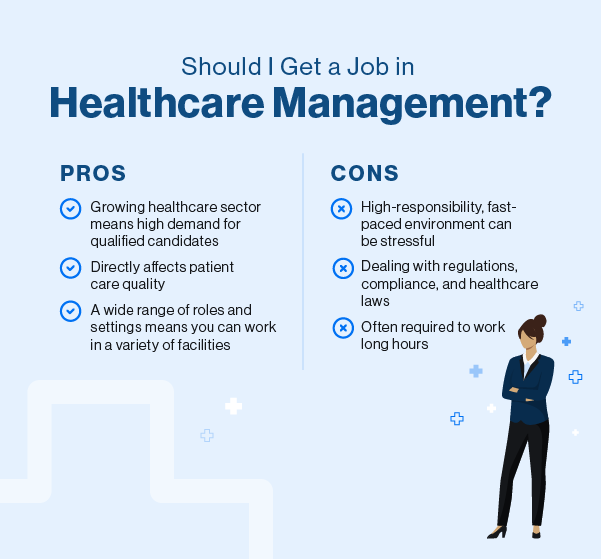
Jobs in Healthcare Management & Healthcare Administration: Your Career Guide
Jan 09, 2024
5 min read
We follow strict quality and ethics policies to make sure our content is honest, accurate, and helpful. Learn more about our editorial guidelines.
An associate degree in healthcare management may prepare you for administrative and leadership roles within healthcare organizations. This two-year program can give you the knowledge and skills to perform entry-level administrative tasks. Some students continue their education and earn a bachelor’s degree, which can lead to higher-paying, higher-ranking roles.
Some jobs you could get with an AAS in business management are:
- Medical office manager
- Practice administrator
- Billing and records coordinator
- Patient services representative
- Clinical support specialist
While it depends on your location, most entry-level healthcare management positions have a starting salary range of $30,000-$55,000*.
What is healthcare management?
Healthcare management focuses on the leadership, management, and administration of healthcare systems, hospitals, and networks. In contrast to healthcare administration, which often deals more with individual departments and services, healthcare management generally oversees the overall operation of facilities or systems.
Here are some duties and responsibilities in healthcare management:
- Strategic planning and goal setting
- Overseeing the budget and ensuring financial stability
- Managing staff and training programs
- Monitoring performance and identifying areas for improvement
- Developing policies and ensuring compliance
- Managing digital health tools
- Maintaining relationships with patients and the community
- Addressing legal, safety, and financial risks
- Overseeing and maintaining the facility
- Handling contracts
Healthcare management roles often require a mix of business smarts, an understanding of healthcare systems, and leadership skills.
Read more: Is Healthcare Management a Good Career?
What is healthcare administration?
While healthcare management often deals with broader strategic planning and system-level leadership, healthcare administration focuses more on the daily duties to ensure the efficient and proper operations of the healthcare organization. It involves managing the day-to-day administrative tasks in hospitals, clinics, nursing homes, and other healthcare settings.
Here are some duties and responsibilities of healthcare administrators:
- Manage the operation of various departments within a healthcare facility
- Ensure compliance with healthcare laws, regulations, and standards
- Manage staffing needs, resource allocation, and patient relations
- Oversee record-keeping, billing, and coding
- Ensure facility maintenance and safety
Healthcare administration jobs need people with great organizational skills, the ability to lead diverse teams, and a solid grasp of healthcare operations. These roles are essential in ensuring that healthcare facilities run efficiently and provide quality care to patients.
What is the difference between healthcare management and healthcare administration?
Healthcare management involves:
- Scope: Overseeing entire operations of healthcare systems or organization
- Responsibilities: Setting goals, long-term planning, policy development, ensuring the overall health of the organization
- Role: Leadership
- Skills: Business management principles, healthcare policies, leadership skills
- Examples: CEO of a hospital system, director of a healthcare facility, health services manager
Healthcare administration involves:
- Scope: Daily operations of specific departments or units within a healthcare organization or facility
- Responsibilities: Staff scheduling, department budgeting, patient flow management, ensuring compliance with regulations
- Role: Operational
- Skills: Administrative skills, knowledge of healthcare systems, ability to manage personnel and resources
- Examples: Clinic administrator, department manager, medical office or practice manager
Many of these functions and tasks may be similar or overlapping in both areas, especially in smaller healthcare settings. The key difference lies in the level of operation - management often deals with broader, strategic, and systemic issues, while administration focuses on specific operational aspects within the system.
Read more: Top Allied Health Careers
How can you get a job in healthcare administration or management?
If you’re thinking about pursuing a job as a healthcare administrator or manager, here is a step-by-step guide to getting the credentials and experience you need:
- Enroll in an AAS program in healthcare management. This will provide you with the foundational knowledge and competencies you need to succeed in the field, including an understanding of healthcare systems, management principles, and healthcare laws and ethics.
- Work in an internship or entry-level position. During or after your program, gain practical experience by seeking internships or entry-level positions in healthcare settings. This will help you to develop your skills, gain valuable work experience, and build your professional network.
- Obtain your degree. Successfully complete your AAS program and earn your degree. Obtaining your degree will improve your career opportunities and make you more competitive in the job market.
- Pursue entry-level healthcare management roles. Once you have your degree, you can apply for entry-level healthcare management roles. These jobs may include healthcare administrative assistant, medical office team lead, or department coordinator.
Once you’ve landed an entry-level job in healthcare administration or management, it’s up to you if you want to continue your education and go for more advanced roles in the future. If you decide to grow your career in management, you may need a bachelor’s degree or gain more work experience.
Here’s what to do if you want to build on your education:
- Go back to school and earn your bachelor’s. You may want to consider further education, such as a bachelor’s degree in healthcare administration or management, which qualifies you for more advanced roles and will expand your job opportunities.
- Gain experience. Work for several years in healthcare settings to gain experience and understanding of the operational aspects of healthcare management.
- Apply for mid-level leadership roles. As you gain experience and possibly further education, aim for leadership positions such as healthcare manager, department head, or practice manager.
- Earn certifications. Obtain professional certifications related to healthcare management to advance your career and gain recognition, such as in healthcare compliance, risk management, and information management systems.
- Go for senior-level management positions. With experience and additional qualifications, you can eventually aim for senior management roles like healthcare administrator or director of operations.

8 Entry-level jobs in healthcare management and administration
Some jobs you can get with an associate degree in healthcare management include:
| Job | Average Salary* | Duties |
|---|---|---|
| Medical Office Manager | $50,000 to $70,000 | Managing day-to-day operations of a medical office. |
| Health Information Technician | $40,000 to $60,000 | Collecting patient data and health information systems. |
| Billing Coordinator | $35,000 to $50,000 | Handling billing and coding processes in healthcare settings. |
| Patient Services Representative | $30,000 to $45,000 | Interfacing with patients, scheduling appointments, and managing front desk operations. |
| Medical Records Coordinator | $35,000 to $55,000 | Ensuring accurate maintenance and security of patient records. |
| Assistant Healthcare Administrator | $40,000 to $60,000 | Assisting in the administration and management of healthcare facilities. |
| Clinical Support Specialist | $35,000 to $55,000 | Supporting clinical teams and managing various clinical operations. |
| Community Health Worker | $30,000 to $45,000 | Focusing on community outreach and public health education. |
* Source: BLS
Is healthcare management a good career path?
Healthcare management is a promising career path with high job growth, competitive salaries, and various career opportunities. Healthcare management professionals can significantly impact their communities and find personal satisfaction in their work.
Deanna Levito, a Penn Foster Healthcare Management Associate of Science program graduate, had a great experience with the program's flexibility and support. She was able to manage all of her different responsibilities and complete the program at her own pace, which was important for her personal and professional growth. Her experience also highlighted the program's adaptability to different life circumstances and its potential to help with career advancement.
What are the pros and cons of working in healthcare management or administration?
Just like any job, there are benefits and challenges about a role in healthcare management or administration:
Pros
- The healthcare sector is growing rapidly, so there are plenty of job opportunities.
- Professionals in this field play a vital role in shaping patient care quality and healthcare delivery.
- There are a variety of roles available, from hospitals to clinics and public health organizations.
Cons
- These roles can be high-pressure, especially in fast-paced work environments.
- Healthcare professionals must navigate and comply with complex and often changing laws and regulations.
- Healthcare professionals may work long hours or may not have a standard schedule, depending on the healthcare setting.
In general, these fields offer great career opportunities but also requires the ability to adapt and thrive in a complex and ever-changing environment.

Begin your journey in healthcare management today
If you're interested in this dynamic and impactful profession, our Healthcare Management Associate Degree program may be right for you. This program offers flexibility and support to balance your education with your other commitments, which may help you grow your healthcare career.
Ready to get started? Our Admissions Specialists are here to help. Call us at 1.888.427.6500 and start your journey to becoming a healthcare management professional today.




